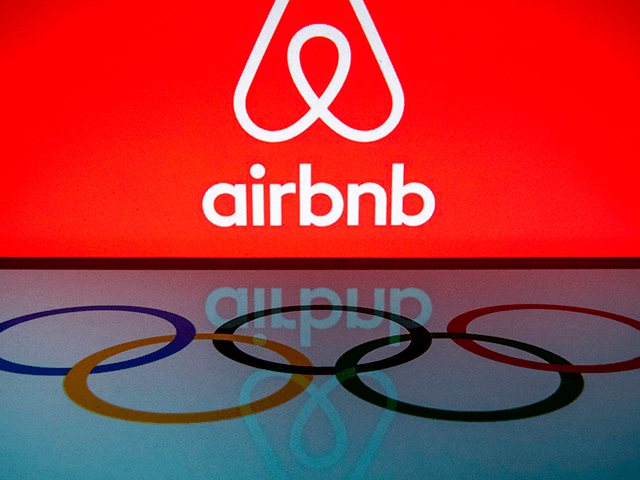According to an investigation published by Axios on Tuesday, top Olympic sponsor Airbnb offers over a dozen homes for rent in the Xinjiang region of China, home of the oppressed Uyghur Muslims – many of whom have been forced from their own homes into concentration camps and sold to both Chinese and foreign corporations as slaves.
Airbnb is an online service that offers various properties for rental, famously allowing people to rent out their homes as if they were hotel rooms or vacation resorts.
Axios found 14 Airbnb listings in Xinjiang, which China has been increasingly touting as a tourist destination, owned by a company called the Xinjiang Production and Construction Corps (XPCC).
The U.S. Treasury Department described XPCC as a “Chinese government entity” and a “paramilitary organization” when it sanctioned the company and two of its officials under the Global Magnitsky Act in July 2020.
The sanctions noted XPCC “First Political Commissar” Chen Quangguo was also Secretary for the Chinese Communist Party (CCP) in Xinjiang, and was directly responsible for “implementing a comprehensive surveillance, detention, and indoctrination program targeting Uyghurs and members of other ethnic minority groups.”
“The entity and officials are being designated for their connection to serious human rights abuse against ethnic minorities in Xinjiang, which reportedly include mass arbitrary detention and severe physical abuse, among other serious abuses targeting Uyghurs, a Turkic Muslim population indigenous to Xinjiang, and other ethnic minorities in the region,” the Treasury Department charged.
Airbnb told Axios it has not discussed the rentals with the Treasury Department’s Office of Foreign Assets Control (OFAC), which oversees sanctions like those imposed on XPCC. The company argued it complied with OFAC rules by screening “the parties we are transacting with, not the underlying landowners.” The comment appeared to confirm that the company was, in fact, doing business in Xinjiang.
Axios noted that some of the properties listed on Airbnb actually state they XPCC-controlled or have the acronym for the sanctioned entity right in their name, such as “XPCC Farmhouse.”
The UK Guardian noted that, in addition to the XPCC-owned properties highlighted by Axios, Airbnb has “hundreds of listings for accommodation in Xinjiang, including some close to sites known to house mass detention facilities.” Some of those detention facilities are operated by the XPCC.
Several analysts said the implementation of OFAC sanctions is complicated, but there is a chance Airbnb could be at risk of regulatory action for renting land owned by a sanctioned entity.
There is also the moral and ethical question of doing business in Xinjiang – which locals refer to as East Turkistan – especially for a sponsor of the upcoming Beijing Winter Olympics.
Airbnb faced similar criticism for listing properties in Cuba, another Communist tyranny. Sen. Marco Rubio (R-FL), for example, asserted that tourists were “putting money in the hands of the Cuban government” and “trafficking in stolen goods” when they stayed in properties that were seized without compensation to their private owners by the regime.
In Xinjiang, not only has much of the local population been herded into brutal re-education camps and forced to accept Chinese Communism as their new religion, but the Chinese government has been ruthlessly destroying thousands of mosques and other ancient structures to replace Xinjiang with a “Disneyfied” version of itself – one more palatable to well-heeled Han Chinese tourists.
Olympic sponsors have been asked to boycott the Beijing Winter Olympics over China’s human rights abuses, a campaign that received a fresh jolt of urgency when Chinese tennis star Peng Shuai mysteriously disappeared after accusing former Vice Premier Zhang Gaoli of sexually assaulting her.
Zhang, the highest-level CCP official accused of such an assault in the #MeToo era, held a leadership position in Beijing’s committee to arrange the Winter Olympics. The International Olympic Committee (IOC) came under fire last week for allegedly helping to whitewash China’s mistreatment of Peng by holding a teleconference with her and declaring she is “safe and well, living at home in Beijing.”
Airbnb is one of the 14 top-level sponsors of the Winter Olympics. The company also sponsored the 2020 Tokyo Summer Games, and has agreed to sponsor more Olympic events until at least 2028.
Human rights groups note with dismay that few of the major Olympic sponsors have responded to their appeals for a boycott, perhaps because they fear economic retaliation from Beijing. The top 10 sponsors of the Beijing Olympics collect an estimated $110 billion in annual revenue from China, money that could easily be taken hostage if the companies infuriate the CCP by standing tall against its human rights abuses.
“There are just three months until the Beijing 2022 Winter Olympics, but corporate sponsors remain silent over how they are using their influence to address China’s appalling human rights record. They are squandering the opportunity to show their commitment to human rights standards and risk instead being associated with an Olympics tainted by censorship and repression,” Human Rights Watch China director Sophie Richardson complained in November.
A bipartisan panel of U.S. lawmakers blasted Airbnb, Coca-Cola, Visa, and other Beijing Olympic sponsors as “pathetic and disgraceful” in July for putting profits ahead of their “commitment to human rights.”
Airbnb’s top Olympics representative, David Holyoke, insisted the company sees human rights as “core to our values,” but said Airbnb has an obligation to “follow local laws and regulations” in China. Like every other U.S. sponsor at the hearing except Steve Rodgers of Intel, Airbnb was unwilling to characterize China’s treatment of the Uyghurs as “genocide.”
“Obviously, every one of you, with the exception on occasion of Mr. Rodgers, was sent here with orders not to say anything that could offend the Chinese Communist Party,” growled Sen. Tom Cotton (R-AR).

COMMENTS
Please let us know if you're having issues with commenting.